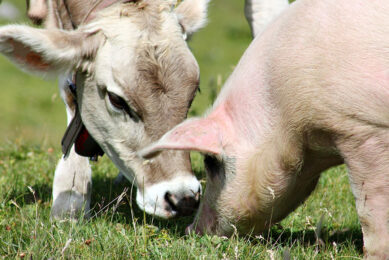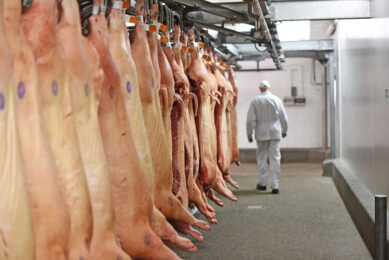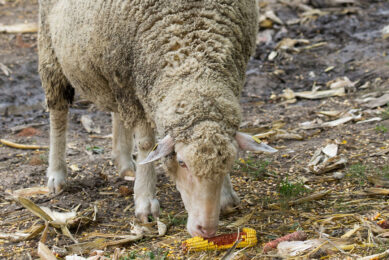By Dick Ziggers
How can a company that is the first malt producer and the first miller in Europe be generally unknown to the general public? The answer is: low key. Their customers were more important than their face in the newspaper so to speak.
The French family-owned company Soufflet has a long tradition of collecting cereals (wheat, barley, maize), oilseeds (rape seed, sunflower) and protein (peas), storing, sorting, grading, processing, packaging and marketing of the products for its French growers. In its 170 silos located in the heart of the French production regions in the 2005/06 campaign some 3.2 millions tonnes were stored and distributed.
Besides this, Soufflet also supplies its crop growers with seeds, fertiliser and crop protection products. Soufflet has one century of experience in the grains area, but always put its customers on the forefront and stayed modest. In its century of grain trading and processing turnover grew to € 2.7 billion in 2006/07 of which € 1.4 billion came from exports (51%).
Soufflet employs almost 4,000 people of which two-thirds are in France. Corporate headquarters are in Nogent-sur-Seine, 120 km east of Paris in the Champagne area. It is the largest malt producer in the world and the largest European miller. Two main buildings determine the sky-line of Nogent-sur-Seine: the nuclear power plant and the Soufflet flour mill with its grain storage silos alongside the river Seine.
A third impressive building is the old Soufflet mill located on the Seine that used hydro-power to run its machines.
Malting core business
One of the main activities of Soufflet is malting; converting barley into malt. Malting is the industrial replication of a natural process – germination – of a grain. During malting the grain will produce metabolites that are necessary for its development. Malt is classically used as a raw material for beer. Soufflet during the years has gained extensive experience in resolving brewers’ issues, such as sanitary security (mycotoxins), quality of the raw materials (soluble beta-glucans) and functionalities of the raw materials (mash filtration). Malting at Soufflet has become a controlled process of ‘guided fermentation’ with non-GM micro-organisms (genus Geotrichum, a type of fungus), creating functionalised malt.
This expertise led to further development of a technology similar to malting:
solid state fermentation (SSF). This technology, also referred to as ‘koji’ (Aspergillus in Latin), is a traditional Asian method for producing food. Soy sauce for example is made through the koji process. It is based on natural fermentation with the use of a micro-organism (yeast) on a substrate (wheat). The yeast transforms the substrate from the inside. SSF is a controlled fermentation with the addition of a specific micro-organism. It allows wheat to endogenously produce metabolites necessary for digestion by micro-organisms or by animals. Wheat and wheat malt are good substrates, because they contain sugars, proteins and plant cell walls. The process is very similar to malt production; guiding fermentation to produce metabolites that have specific functionalities, in feed for example, xylanases and glucanases. “On the one hand koji is a traditional method, and on the other hand a very promising research area,” says Mathieu Tournat, new business development manager at Soufflet.
Osiris R&D project
To be able to further develop SSF and to tap on French subsidies Soufflet initiated the Osiris R&D programme in cooperation with two other partners: the company Maguin and the chemical biology laboratory of the Institute of Supramolecular Science and Engineering, part of the Louis Pasteur University in Strasbourg. The French State agreement for financial support from December 2006 was approved by the European Commission in October 2007.
EU Competition Commissioner Neelie Kroes said “Osiris will help to develop new products for the benefit of consumers and this will have a positive effect on the whole of the EU.”
The Osiris R&D programme is worth a total of €77 million over a period of eight years, of which €31 million is granted by the French government. It aims to produce tools for the rapid selection of micro-organisms, develop industrial solid-state fermentation processes and create specific biotechnology products to improve the yield of biofuel production from wheat and maize in particular. These biotechnology products should also boost the performance of cereals and oilseeds and protein crops used for animal feed and increase the yield of co-products of biofuel production. They will also generate health benefits for consumers of non-alcoholic beer and malted beverages. Finally, they will protect cereal crops from the disease fusariosis. The Osiris programme started on January 1, 2008.
Around 60 researchers are involved to develop a coherent strategy in adding value to grains,” says Tournat, “which fits perfectly in the Soufflet Group’s tradition. It is a new challenge for our company. We are involved in this project to exploit the potential of solid state fermentation technology for adding value to grains using biotechnology,” Tournat explains. “Our aim is to develop a range of functional raw materials for the animal feed market that are adapted to the feed market’s needs. We aim at the global feed market; the start was in France and we are also now looking for interested parties in Europe.”
Functional raw material
The R&D work focuses on several issues, such as substrate, micro-organisms, and the fermentation process with the aim to develop a new biocatalyst for animal feed. Avimalt is the first, and a pilot project within the innovative product range of Soufflet. It is defined as a functional raw material. “Avimalt was the first product using our R&D approach and it is a cooperative development between our malting unit and our subsidiary Lyven, which has a long experience in solid state fermentation,” Tournat says.
“We wanted to develop an ingredient that has a constant composition, takes part in enhancing performance, adds value to local agricultural sources, contributes to the reduction of animal rejections and is innovative,” says Tournat summarising the research goals. The functional raw material is made from malted and naturally fermented non-GM wheat. It was developed to add wheat specific metabolites and nutrients essential for animal growth to the feed and thus improves zootechnical performance. Avimalt can be used in every livestock species and is industrially produced in Soufflet’s malting plant in Arcis-sur-Aube.
Production process
The koji process is a derivative of the malting process. Wheat is soaked and then inoculated with a micro-organism (fungus) after which the germination stage and the guided fermentation takes place. This is followed by the kilning stage where the substrate is heated and dried and eventually grinded and conditioned. During these processes a cellular multiplication in the grain takes place. Several natural products are produced, such as cellulases and hemicellulases for digesting plant cells, proteases for hydrolysing proteins into peptides and amino acids, amylases for converting starch into single sugars and NSP-ases for hydrolysing the complex non-starch polysaccharides.
Furthermore the fermentation product has a booster nutritional effect because of its excess of vitamins and trace elements, such as Vitamin B9 (180-200 µg/100g), Vitamin D3 (2.0-2.5 µg/100g), Vitamin E (0.25-0.35 mg/100g), Iron (35-40 mg/kg), fungus biomass (peptides, amino-acids) Avimalt’s composition contributes to improving the animal’s access to the nutrients in the feed and hydrolysis into simple sugars. This also reduces the viscosity of the feed in the gut.
Performance improvement
Soufflet carried out several experiments to obtain data on the performance of the product. From a trial carried out at the University of Leuven in Belgium, it was found that in broiler chicken Avimalt has a significant dose-response effect on weight gain.
It gave 5-8% improvement of feed conversion ratio and 5-7% improvement of average daily gain (Table 1). Diets were wheat based, which is very common in Europe, but also is an optimal situation for the use of Avimalt. “In France we tested and sell the product mainly in the ‘label’ segment of the market”, adds Tournat. “This is a premium market with a different economical structure than the ‘general’ broiler industry. We first wanted to open up the more high-end of the market.” Avimalt is used in mash feed as well as in pelleted feed in the label-segment. Avimalt is a powder and can be added to the feed before or after pelleting. Because of the sugars from the malting process the product has a sweet taste and a good palatability. At a French cooperative feed miller, a trial with turkeys was carried out resulting in a 2% improvement of FCR and 1% improvement of daily gain (Table 2).
Besides that, important improvements during the cramming and finishing stages could be observed. The French research institute INRA tested Avimalt in rabbits and found no significant effect on ADG, neither on mortality. There was a feed intake decrease (p=0.08) and a dose effect on FCR was observed. Currently tests are running in ruminants and pigs and aquaculture is also aimed at.
In conclusion
Soufflet is a new player that enters the performance feeds market. Further developments and research will tell if they will become successful. With their first product Avimalt, they have created a functional raw material which is useable in most livestock species, and which is optimised for use in wheat-based diets. It is made using traditional technologies with natural methods applied to a natural raw material coming from a food process applied to the feed industry. Soufflet will take part in Eurotier 2008, in the World Poultry Show section.
Diversification In marketing there are generally four strategies that most companies follow to sell their products and services: market penetration (existing products in existing market), product development (new products in existing markets), market development (existing products in new markets) and diversification (new products in new markets). The latter is a form of growth marketing strategy for a company. Ansoff, who defined afore mentioned strategies pointed out that a diversification strategy stands apart from the other three strategies because it requires a company to acquire new skills, new techniques and new facilities. Therefore, diversification is meant to be the riskiest of the four strategies to pursue for a firm. |
Source: Feed Tech magazine Volume 12. No 8

 Beheer
Beheer









 WP Admin
WP Admin  Bewerk bericht
Bewerk bericht